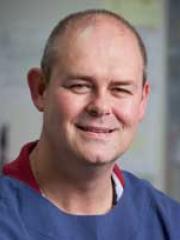Associate Professor Graham Leggatt

Associate Professor Graham Leggatt leads the Skin cancer immunotherapy group.
“We didn’t appreciate how early this process starts,” says Leggatt. “The cancer is dragging in cells that could kill the cancer but it also attracts cells that can suppress the immune system.” The tumour ultimately attracts more suppressor cells and establishes a protective microenvironment that fosters further growth. Leggatt believes a clearer understanding of that immediate immune environment could give rise to novel anti-cancer therapies.
Leggatt’s path toward immunology began early. “I was always interested in how things worked. In Grade 10, my science teacher really made me think about doing a science degree.”
Leggatt went on to complete a Bachelor of Science and an Honours degree in microbiology. As he pursued a PhD at the Queensland Institute for Medical Research (QIMR), he began working on the diagnosis of Hydatitid disease - a parasitic disease found mostly in animals, but transferable to humans.
This venture into parasite immunology was Leggatt’s first insight into translational research and it crafted the way for his current career in immunology. Leggatt soon embarked on post-doctoral research at the National Institutes of Health (NIH) in the US in the laboratory of Professor Jay Berzofsky, a well known immunologist who was working on HIV.
“We discovered that the quality of the T-cell response to a viral infection is very important," Leggatt says. A T-cell population can present billions of different possible receptors in response to an infection, he explains, but it became apparent that it isn’t the quantity of T-cells that matters, but how specific the T-cell receptors are to the invading pathogen.
In 1997, Leggatt met Professor Ian Frazer – co-inventor of the cervical cancer vaccine – while at an immunology conference in New York. The encounter led to an opportunity to work with Frazer at the University of Queensland’s Centre for Immunology and Cancer Research (CICR), so Leggatt returned to Australia to investigate the quality of T-cell responses in Human Papiloma Virus (HPV), the primary cause of cervical cancer.
His research focus soon shifted to immunotherapy. While the cervical cancer vaccine prevents HPV infection and therefore substantially reduces cervical cancer risk, Frazer, Leggatt and their colleagues began searching for ways to use the immune system to treat women already diagnosed with cervical cancer. Leggatt notes that he is grateful he had the opportunity, during his first years in the lab, to collaborate with the late virologist Dr Jian Zhou– co-inventor of the cervical cancer vaccine with Professor Frazer. “I benefited highly from that experience,” he says.
Leggatt is now a Senior Research Fellow at the University of Queensland Diamantina Institute (UQDI), where he is researching the immune environment in the skin and how its suppression allows early cancerous lesions to grow. He believes that advances in this area could not only guide the development of cervical cancer immunotherapies, but could also help explain how immunity is controlled in other epithelial cancers, including Squamous Cell Carcinoma.
Leggatt believes UQDI is an ideal place to carry out such research. “I am able to work with people like Ian who have vast knowledge and experience in epithelial cancer. There are also fantastic facilities available to us at the UQDI to do all the work – we can do just about anything we want to do.”
Dr Leggatt also enjoys lecturing part-time at The University of Queensland. “There’s a thrill in teaching the next generation of researchers in immunology.”
Research interests
CD8 T cell tolerance to skin antigens/ skin tumours; combined immunotherapy/chemotherapy of tumours; and CD8 T cell avidity.
Research projects
- Trafficking of T cells to cancerous skin
- Immunotherapy of skin tumours after lymphodepletion
- T cell function in normal and cancerous skin tissue
